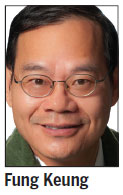Country parks are lovely, but people need homes too
Updated: 2014-12-22 05:56
By Fung Keung(HK Edition)
|
|||||||||
On Dec 16, the Hong Kong government announced a10-year housing plan for the city, which calls for the construction of 480,000 units in total by 2023. Of the total number of units to be built, around 290,000 will be provided by the government and the remaining 190,000 by the private sector.
The latest public and private construction numbers together represent an increase of 69 percent from the previous 10 years (2004-2013). The increase is substantial.
The 290,000 units pledged by the government consist of 200,000 public rental flats for low-income families and 90,000 subsidized ones for sale, mainly to the city's middle class.
The question is: where do we find the land to build the 480,000 flats?
Private housing prices in Hong Kong have skyrocketed in recent years, partly because of strong demand from mainland investors. But the real culprit is a shortage of land. When developers pay high prices for plots, they will subsequently charge higher prices for the flats they build. It is a no-brainer.
The government, meanwhile, cannot afford to sell cheap to developers as a major chunk of its annual income comes from land sales. This dilemma has existed for many years and no light can be seen at the end of the land-supply tunnel, so to speak.

Indeed, we have abundant swaths of underutilized land in Hong Kong. It is just a matter of setting priorities straight. Hong Kong has huge amounts of usable land in its country parks, some of which can be used to build public rental or subsidized flats.
Conservation groups and green parties probably will voice their opposition to this so-called environment-unfriendly suggestion. Government officials, however, must have the moral courage to set the priority straight. Many low-income families and young people, who cannot afford to purchase apartments in the private market, are looking forward eagerly to renting or buying government-built units. Government officials must not disappoint them and should have the fortitude to ignore the protests of conservation groups.
Whether the city's low-income families and young people living in crammed or so-called subdivided units appreciate the idea of visiting the mostly monkey-occupied country parks is indeed open to question. Government officials must strike a balance between the demands of green groups and the quest of the city's underprivileged to find a decent home.
In the New Territories alone, there are scores of country parks that were set up in the colonial era when Hong Kong's population was about 4 to 5 million. (Who hasn't set foot on Lord MacLehose' s circuitous trails that span the New Territories from Sai Kung to Sha Tin and Tuen Mun?) Now we have 7 million inhabitants in this tiny city. We simply cannot afford to set aside so much land for country parks. Even if the space dedicated to country parks is cut by half, there would still be more than enough for people to enjoy the countryside.
Another method of creating land is reclamation. It is understandable that the greenies don't want us to spoil the beauty of Victoria Harbour by having more reclamation done along the waterfronts of Tsim Sha Tsui and Central. But for God's sake, what is wrong with reclaiming more land on some outlying islands that are scarcely populated and rarely visited by city folks on weekends? Many young people wouldn't mind living in these outlying islands if they could afford to buy a unit there.
Building public units in country parks and reclaiming more land for government-subsidized flats are politically sensitive issues that government officials might find too hot to touch. But that is exactly where leadership can make a difference. It is time officials showed us they have the valor and moral fiber to say no to the greenies and set the priorities straight for the majority of Hong Kong's 7 million people.
The author is a veteran journalist and senior lecturer at Beacon College, an English tutorial school.
(HK Edition 12/22/2014 page8)